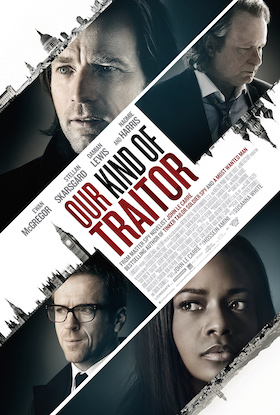[Minor Rock Fist Up]
 A postmodern Cold War thriller that pits the Russians against England’s MI6, Our Kind of Traitor is like a B-roll James Bond flick stripped of most of its action set-pieces, yet imbued with a plot and characters more sophisticated than the average 007 fare.
A postmodern Cold War thriller that pits the Russians against England’s MI6, Our Kind of Traitor is like a B-roll James Bond flick stripped of most of its action set-pieces, yet imbued with a plot and characters more sophisticated than the average 007 fare.
Adapted from the 2010 John le Carré novel of the same name, Our Kind of Traitor tells the story of a milquetoast academic from England who gets tangled up in an international criminal conspiracy linked to the Russian mafia and the British Parliament. Subtle imagery cues and strong acting turns bolster the overall effort, while the plot, truncated from its literary source, struggles to move through all the appropriate story beats to get the audience from A to B. The end result is a well-acted, beautifully shot thriller whose narrative feels a bit forced at times, yet is saved by believable characters, brisk pacing, and splendid performances from top to bottom.
Ewan McGregor plays Perry, a university professor on holiday with his wife, Gail (Naomie Harris), in Marrakech. Subtle hints early on paint the marriage as a bit shaky, which allows a gregarious Russian named Dima (Stellan Skarsgård) to insert himself into their trip. Dima tells Perry that he is also on holiday, and invites the reluctant professor to come to a party with him after Gail ditches her husband to attend to some work-related chores. Dima is boisterous, wealthy, and eager to please, and while Perry seems a bit staggered to find himself suddenly in such strange company, part of him seems relieved and almost liberated.
However, things take a turn when Dima reveals that he is actually wired into the Russian mob scene, and go further off the ledge when he tries to enlist Perry as a contact to pass sensitive information along to British Intelligence (MI6). Balancing imagery pops up frequently throughout Our Kind of Traitor, be it in the form of a ballet dancer spliced into the opening credits, or a sculpture of a bear on a wire later in the picture. It’s a visual cue that feels entirely appropriate, for the film really is a balancing act for both Perry and Dima, who have to repeatedly weigh needs, desires, and consequences against each other.
For Perry, one gets the sense that he’s feeling marginalized by his wife’s success and social standing, and longs to be relevant once again despite the danger his new friend represents. For Dima, there’s an obvious push and pull between his sense of professional versus familial loyalty, along with a notion of what is right for him balanced against what is right for his family.
Things are further complicated for the pair by their MI6 handler, Hector (Damian Lewis), whose own loyalties and motivations are slowly drawn out over the course of the story. Hector has his own reasons for going after the crooks Dima is trying to expose via Perry, yet larger geopolitical concerns and Hector’s own checkered past throw roadblocks up around seemingly every corner. International political tensions between Russia, the E.U., and U.K. play into matters as well, for Dima is at the center of a financial vortex involving all three factions. All of this is established masterfully throughout the first act, yet as director Susanna White moves into the second, things start rolling downhill a bit too fast.
Hector, who comes off like James Bond’s closeted, bookish roommate, is saddled with the unfortunate responsibility of unpacking all of the plot’s baggage when conversations between Dima and Perry don’t quite fill in all of the gaps. And while Lewis does outstanding work bringing the character to life with his perfectly manicured appearance and mannerisms, his function in the movie is more or less as an intermediary between parties.
Although he is responsible for pushing the events of Our Kind of Traitor into motion once Perry returns to London, the film most often uses Hector as something of a real-time exposition guide who walks everyone through each new development. This particular shortfall is somewhat understandable considering the film’s adaptation from a meaty spy novel, yet considering how deftly Hector is developed throughout the course of the film, this contradiction between character and narrative quality is a bit jarring.
None of this is enough to derail the larger effort, though. Our Kind of Traitor weaves a believable web made up of strands of international crime, politics, and finance spun across a modern Europe coping with 2009’s financial turmoil, and a saber-rattling Russia exerting increasing influence on its neighbors. And just as the world this film inhabits feels genuine and lived-in, so too do the characters, who transcend their simple functions in the story to become individual agents with believable arcs. Perhaps not as riveting as Eastern Promises, or as politically complex as Tinker Tailor Soldier Spy (another film based off of a le Carré novel), Our Kind of Traitor finds its footing within this genre without too much trouble.
Opening tomorrow, Our Kind of Traitor is a gripping spy yarn that forgoes the Bond and Borne tropes in exchange for a more cerebral, character-driven adventure. A bit clunky at times, the development of Perry, Gail, Dima, and Hector within the geopolitical framework of the story at-large supplement the cloak and dagger spy fights that typically define this cinematic trope. It is a nice change of pace for the genre, and a fun, spry dive down the international espionage rabbit hole.







Comments on this entry are closed.